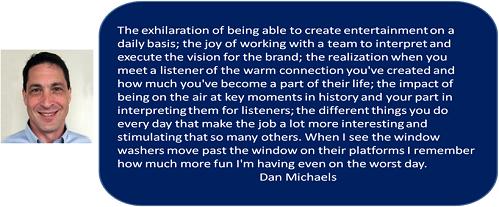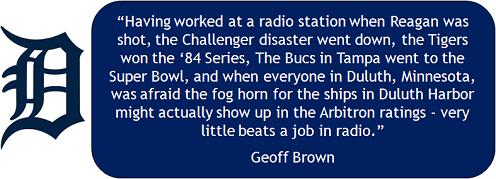You may have seen it in Forbes. One of those best/worst jobs lists recently came out, and yup, “broadcaster” made the list you don’t want to be on.
 The “research” was conducted by the job guidance site CareerCast.com and evaluated 200 professions. Along with one of the worse jobs being a traditional broadcaster, the Forbes list also included waiter/waitress, lumberjack, dishwasher, oil rig worker, and butcher.
The “research” was conducted by the job guidance site CareerCast.com and evaluated 200 professions. Along with one of the worse jobs being a traditional broadcaster, the Forbes list also included waiter/waitress, lumberjack, dishwasher, oil rig worker, and butcher.
Yikes.
When I tweeted the story out, I started to receive indignant responses from many in the radio community, questioning the survey and Forbes’ motivation. (“Newspaper reporter” was also on the Worst 10 list, so maybe there’s a PR method to this bad job madness.)
Nonetheless, this started something – on Twitter and I later took it to Facebook. So listed below are a sampling of the responses I received stating why being a broadcaster is a great profession, directly from people in the industry.
Maybe it’s worth passing these around your station or your community. Please list any additions to the comments section of this post.
In spite of all the pressures over the past few years, there are still many people in our industry for whom the passion has not waned.
In any case, I was reminded that oil riggers make a lot of money and that conditions for DJs aren’t what they used to be.
Still, many characterized it as the best job they’ve ever had – or have. Those who are no longer on the air truly miss those days.
What do you think?
- What To Do If Your Radio Station Goes Through A Midlife Crisis - April 25, 2025
- A 2020 Lesson?It Could All Be Gone In A Flash - April 24, 2025
- How AI Can Give Radio Personalities More…PERSONALITY - April 23, 2025














I can think of only ONE bad radio memory, and that is the first day I woke up knowing I might never be able to go back to it. Even at the worst of times, there are so many bright moments. I try to bring some of my radio spirit to my “civilian” job, and it helps, but there is no comparison to the energy and the impact that can be made with a few people that give a rat’s a##, a broadcast signal, and a few social tools. I miss it every single day. I can only hope that everyone with the privilege of working in the industry appreciates it as much as the truly class acts that commented above.
Gregg, I think that everyone who is on the air or has ever been will appreciate your heartfelt comments. Thanks for the reminders, and best of luck.
At issue here is really definition of terms.
The Forbes list for “Best” is for the most part, jobs that seem to have a future. The “Worst” is chocked with a combination of what many might see as “awful” jobs and jobs considered to have no or little future. Broadcasting is seen as one of the latter.
While I don’t believe that many would think of broadcasting as a “Bad” job, many would deduce that it has little future, within the current tech state of affairs (although many, including myself, would argue otherwise). That argument, pro and con, is best left for discussion and argument at another time.
All that being said, like many others, I no longer work in broadcasting… and I too miss it every single day.
You make some good distinctions. However, when it comes to oil rigger, waitress, and dishwasher, I would submit that there will certainly be a lot of those jobs. How you define “future” is another issue. We don’t know exacltly how Career Cast conducted their survey, the criteria, etc. But as some commenters have pointed out – here and on Twitter – it sure sends a message to our industry heads about perceptions and the ability to recruit and grow talent moving forward. Thanks, John, for the thoughtful comments.
Who we are not considering here are the on-air broadcasters who are no longer working as broadcasters due to there being many fewer jobs in the post consolidation era.
Sure if you have a gig on the radio, then broadcasting is the greatest profession that I can think of. We all know that and it’s why we do it. What’s missing are the voices of the very many broadcast professionals who have been consolidated, downsized and voice-tracked into oblivion.
Perhaps some have forgotten that radio wasn’t always an industry controlled by
investment bankers and shareholders. It once was a family business where owners themselves often came from the on-air side of the industry. The owners were in radio because they loved radio. They had a much lower overhead and weren’t over leveraged with debt, therefore they could employ more more people and create a more compelling and unique product.
Showing quarterly growth for shareholders and paying down over extended debt has made the on-air broadcaster the least important and most expendable aspect of a broadcast operation.
So yes, being a broadcaster is one of the greatest jobs in the world.
We all know that. Cherish it and and treat it with respect and reverence. It’s also becoming one of the most scarce jobs in the world.
No doubt that many have taken being on the air for granted. Like many industries, radio has changed in many ways. Thanks, Mark, for reminding us of how precious those radio gigs really are.
Even after this many years, rock radio is still a great gig. There’s lots of poetry about connecting with an audience, moving, community…etc etc etc…and it’s all true. The real and most honest reason you’ll find is, radio is a great gig because everyday I get to rock the face right off your head. It’s my jobs to try and peel your ears back with guitar riffs…to inject Jimi, Duane, Angus, Slash, Kirk, Page directly into your cranium…and THAT will never stop being fun.
Here here!! Thanks, David.
If radio was so rubbish…why do I have 70 volunteer DJs who beg me for airtime each week.
Just sayin’
WIlly, the numbers don’t lie. Glad to hear you’re in demand. Thanks for contributing.